Folks using screen readers and anyone who prefers to listen — there’s an audio player bar just below this paragraph, with a play button on the far right. Please let me know if you have any trouble with it.
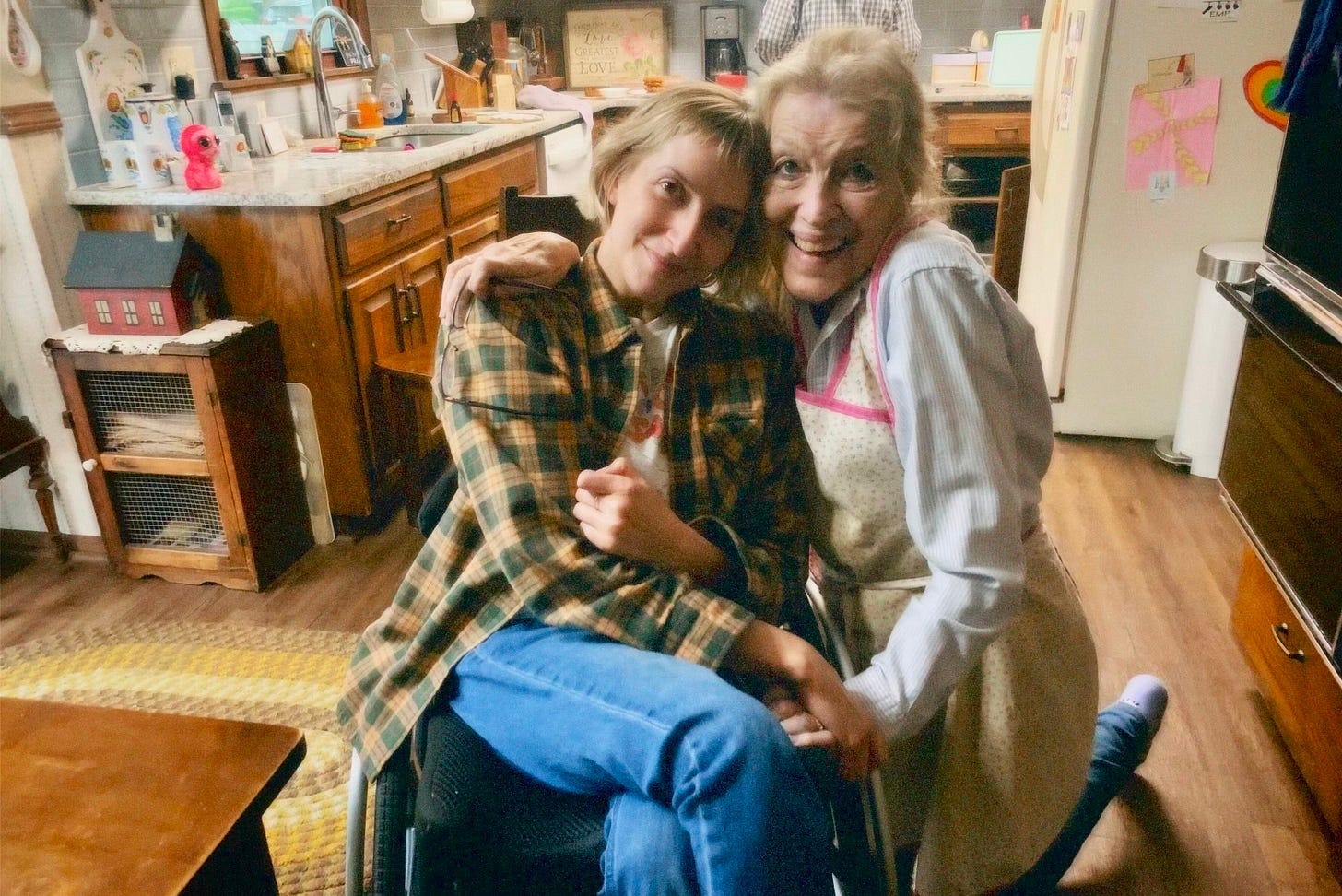
When I talk with my mom on the phone, our greetings follow predictable patterns.
“How’s your pain today?”
“It’s more of a murmur, not screaming.”
“Have you taken any pain pills?”
“I have so much on my plate today – I took them first thing.”
“You think it’s a UTI?”
“I don’t know. I’ll see if I can make it to Friday. I hate to go in only to have them tell me it’s nothing.”
Either party could play either part. We’re two old ladies on a sitcom – a parody of the wrinkly bitties chatting about our arthritis over tea – setting the stage for the joke so everyone can laugh at how boring we are – how singularly obsessed with our ailments, our aches and pains.
Crip time is often imagined as a pace that exists outside of the relentless push for faster, faster, faster, get it done, do-more-in-less-time culture we’re living in, but lately I’ve been feeling another branch of crip time – the timeline that exists outside the bounds of expected birthday milestones or a linear trajectory of aging. In “Six Ways of Looking at Crip Time,” Ellen Samuels writes,
Crip time is time travel. Disability and illness have the power to extract us from linear, progressive time with its normative life stages and cast us into a wormhole of backward and forward acceleration, jerky stops and starts, tedious intervals and abrupt endings.
I’m nearing 40, but in many ways, my body’s age feels less like my peers’ and more like that of my mother’s 75-year-old body. We ache. We’re in pain. We marvel over the slow breakdown of our organs. We tally our falls. We discover injuries on our bodies without clear origin stories and track how many months it takes for them to heal. The cliché laugh about old age is how mundane the conversations become, but I dare any human to witness the slow decay of their own body without obsessive attention. Like expecting the captain of a ship to offer witty banter while his vessel slowly, slowly sinks into an immense black ocean. Or waiting for the caterpillar to engage you in philosophical discourse while it slowly melts into an entirely new being. What buffoonery – to expect anyone to be anything other than preoccupied as we witness our own transformation.
But my body doesn’t just catapult me into the timeline expected of old age. I find myself yanked backwards into a timeline that overlaps with my young son as he gets acquainted with his body for the first time. I watch him and relate to the effort it takes to get dressed – wriggling and writhing his body just to pull those pants over his bum while keeping the seams straight. How easy it is to wet his pants, even after he thought he’d mastered the skill.
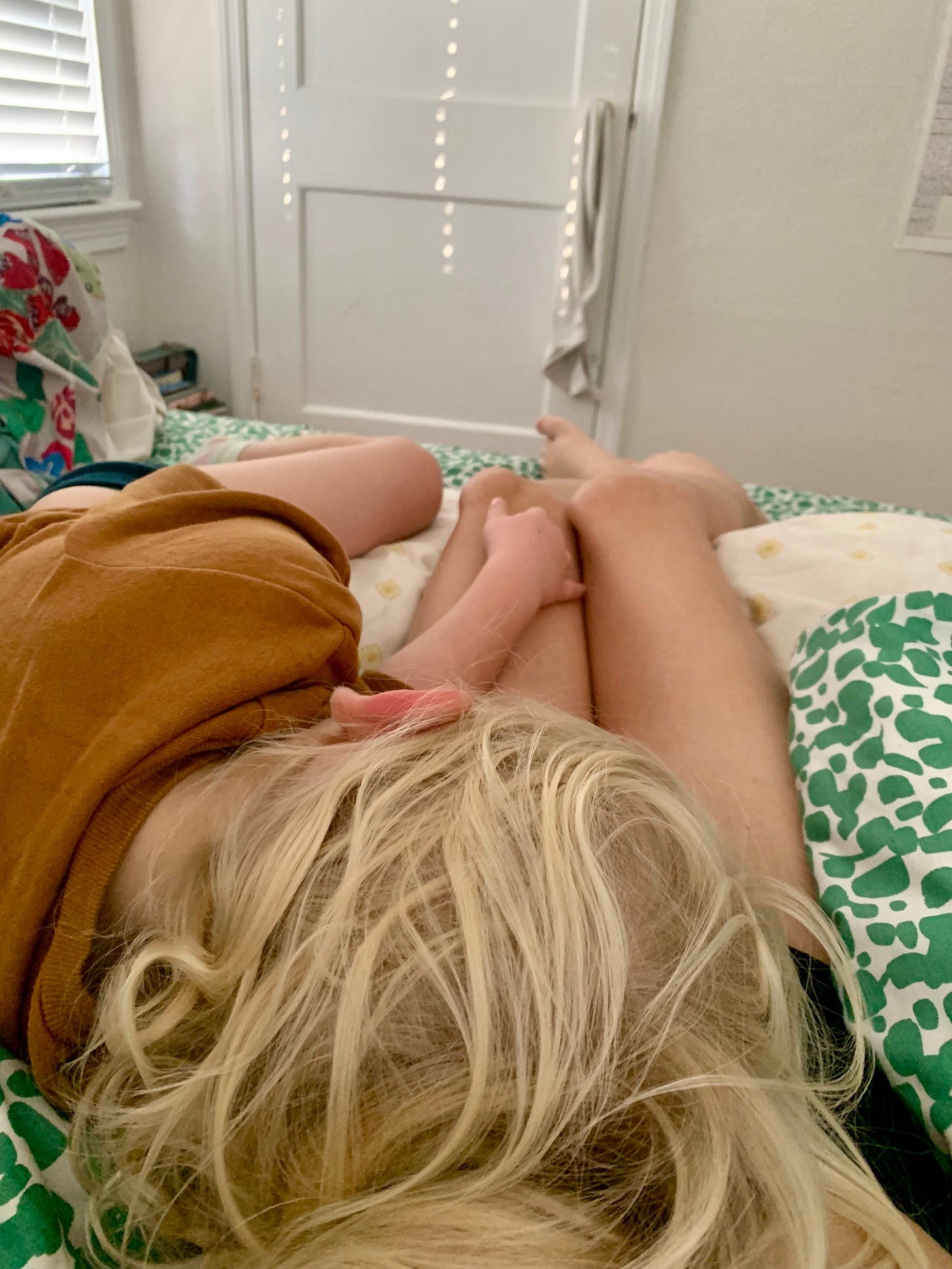
One day, right in the middle of that inevitably messy stretch of potty training, I hear my son parrot an idea I’ve heard many times. “Only babies wear diapers!” Sometimes I hear this phrase from the mouths of other children, but I’ve also heard it from adults as a way to incentivize toilet training. Shame is an effective motivator. But it’s not just the words – it’s the tone my son copies. I’m sure you can hear it in your own mind. Mocking. A harsh twang that lands like a slap. I whip my head up, “Not true,” I say, instinctively, like a weapon I draw on reflex against an incoming threat.
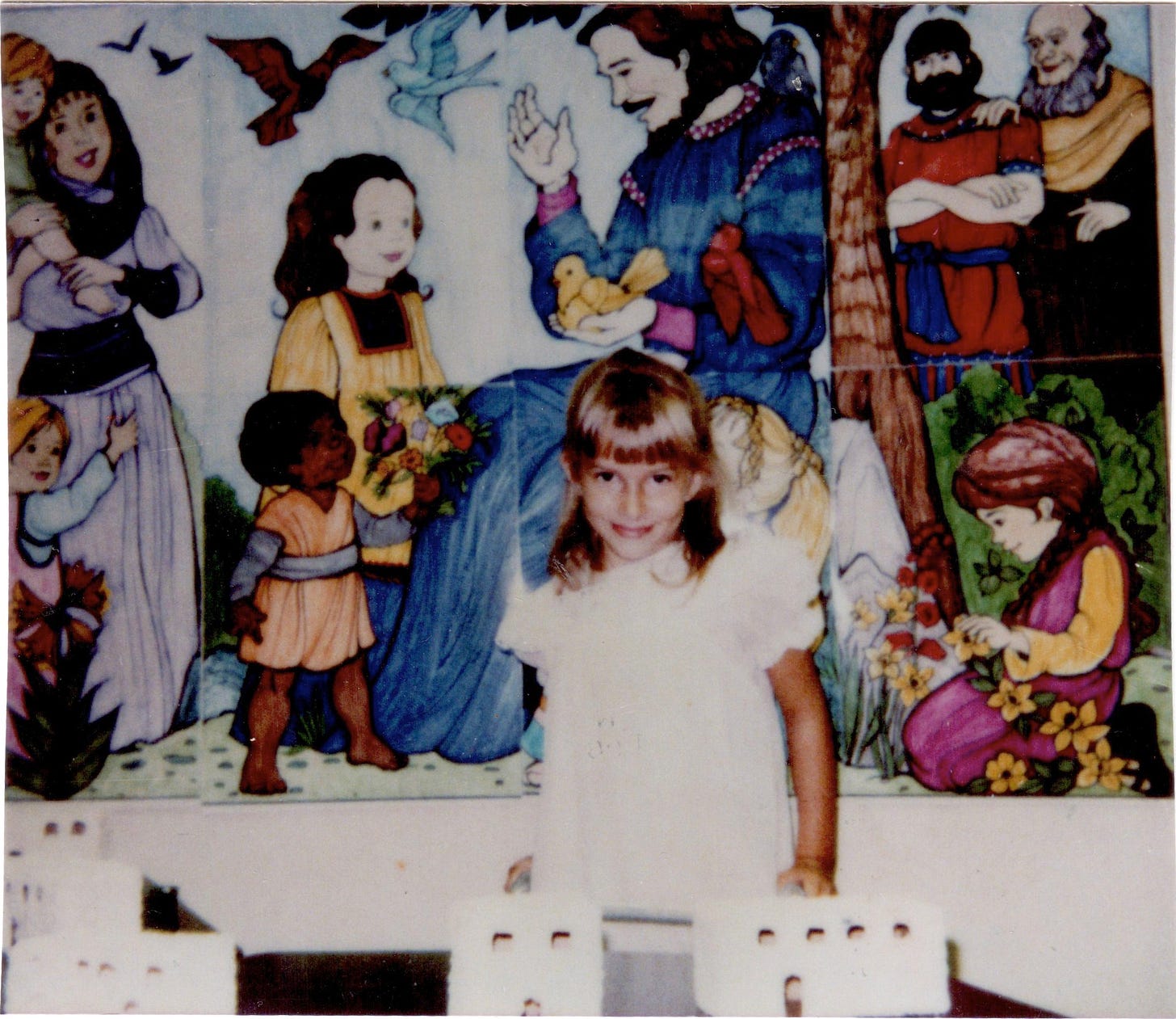
I’m eight, standing in line for recess, gripping my walker. I don’t walk often, and the sensation of standing feels novel. I enjoy being eye level with my peers. I’m wearing a thin green dress covered in tiny white polka-dots. There are ruffles down the front and around the hem. I rock my torso back and forth, watching the skirt brush over my legs.
“You’re wearing a diaper,” the girl behind me accuses loudly. Her voice sears with something worse than disgust – is it hate?
My entire head bursts into hot, shameful flames. My heart beats hard against my eardrums – wild thumping like it’s fighting to break its way out. I stop breathing.
Because of my limited feeling, it is taking me longer than my peers to learn to control my bladder, and, in the middle of second-grade, I’m still a ways off from figuring out how to use a catheter to avoid accidents. I’m not proud of this, but I haven’t yet learned to be ashamed of it.
“No, I’m not,” I say quickly, fearfully. I don’t turn around to look at her.
“Yes, you are. I can see it through your dress!”
“I’m not,” I insist. I’m not, I’m not, I’m not, I’m not, I continue to swear, even when the accusations end. Even when I’m by myself.
When I’m twelve, I sit in the car as we drop off my grandma at her house. I watch her get up slowly, her body always always in pain. She walks up to her front door, taking one intentional step at a time, head held high in her taupe dress, scarf tied around her neck, pearl clusters clipped onto her earlobes and a spot on the back of her dress announcing to everyone in the car that she had wet her pants.
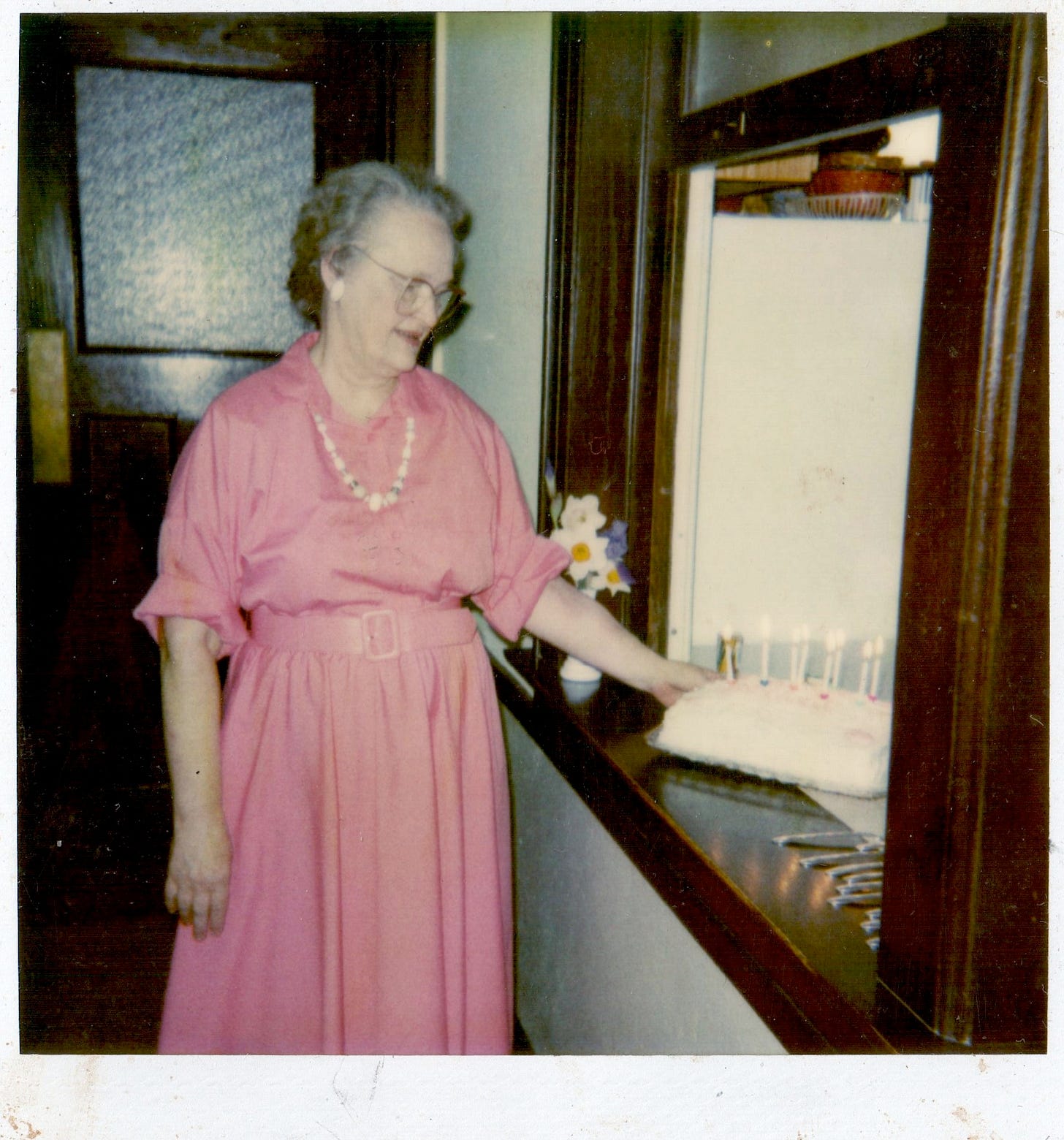
When I’m 36, still wearing pads to catch my postpartum bleeding, our tiny baby tucked into the carseat, I drive my husband home from the hospital. He’s recovering from the second surgery he’s had after his colorectal cancer diagnosis, and on his first night home, I see him sit on the toilet for hours – through the evening and into the morning. Finally he comes back to bed, dizzy with fatigue. It’s minutes later when he rushes back to the toilet. I call my dad in the early morning – “Could you bring us some diapers?” I ask, voice thin and high. When he arrives an hour later, we almost cry with relief as we rip open the package with the iconic, punchline-of-a-word printed across the front – “Depends.”
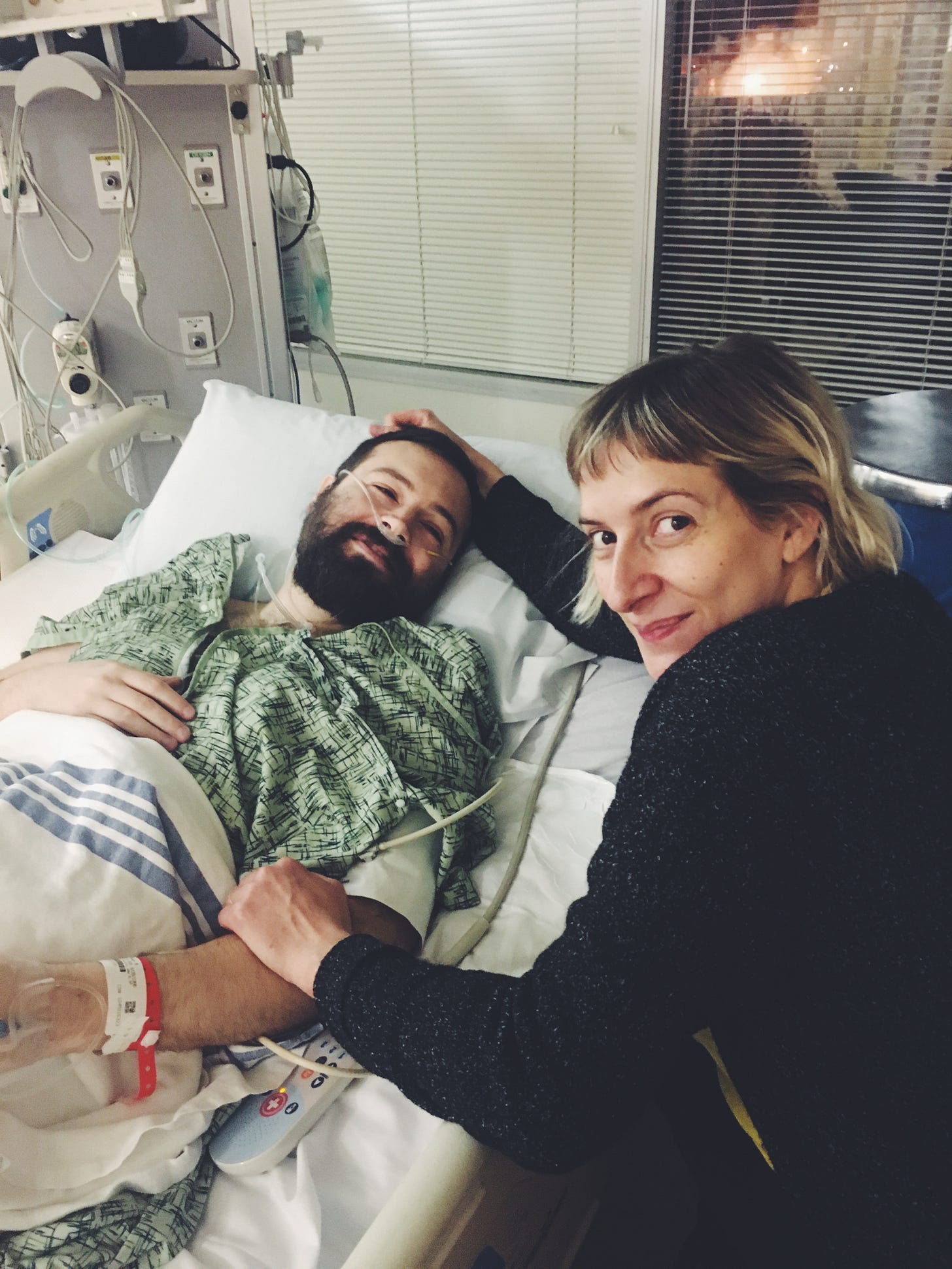
“Actually,” I say to my son, “lots of people wear diapers. They are a great tool when you need them. Diapers have helped me and your dad when we needed them, and not just when we were babies.”
“Oh!” he says, genuinely surprised.
Every time I go to the hospital, they put a neon orange band on my wrist with FALL RISK printed in all caps. For a long time, the drama of the blaring font and the neon declaration made me laugh – WATCH OUT FOR THIS ONE, SHE’S ABOUT TO GO DOWN!!! – but lately, as the falls have been more frequent, I’m starting to worry about the one that will result in a broken bone. Lurching ahead of the typical timelines, I am already thinking about how I will stay out of a nursing home when my body inevitably requires more care. I am ancient. And also, I am always rushing to the bathroom, wiggling back and forth with lemon-yellow electricity, and I do not always make it. I strip off my wet pants with the same swift motion I use to pull off my son’s leggings when he doesn’t make it. I am yanked back in time, parallel with my toddler.
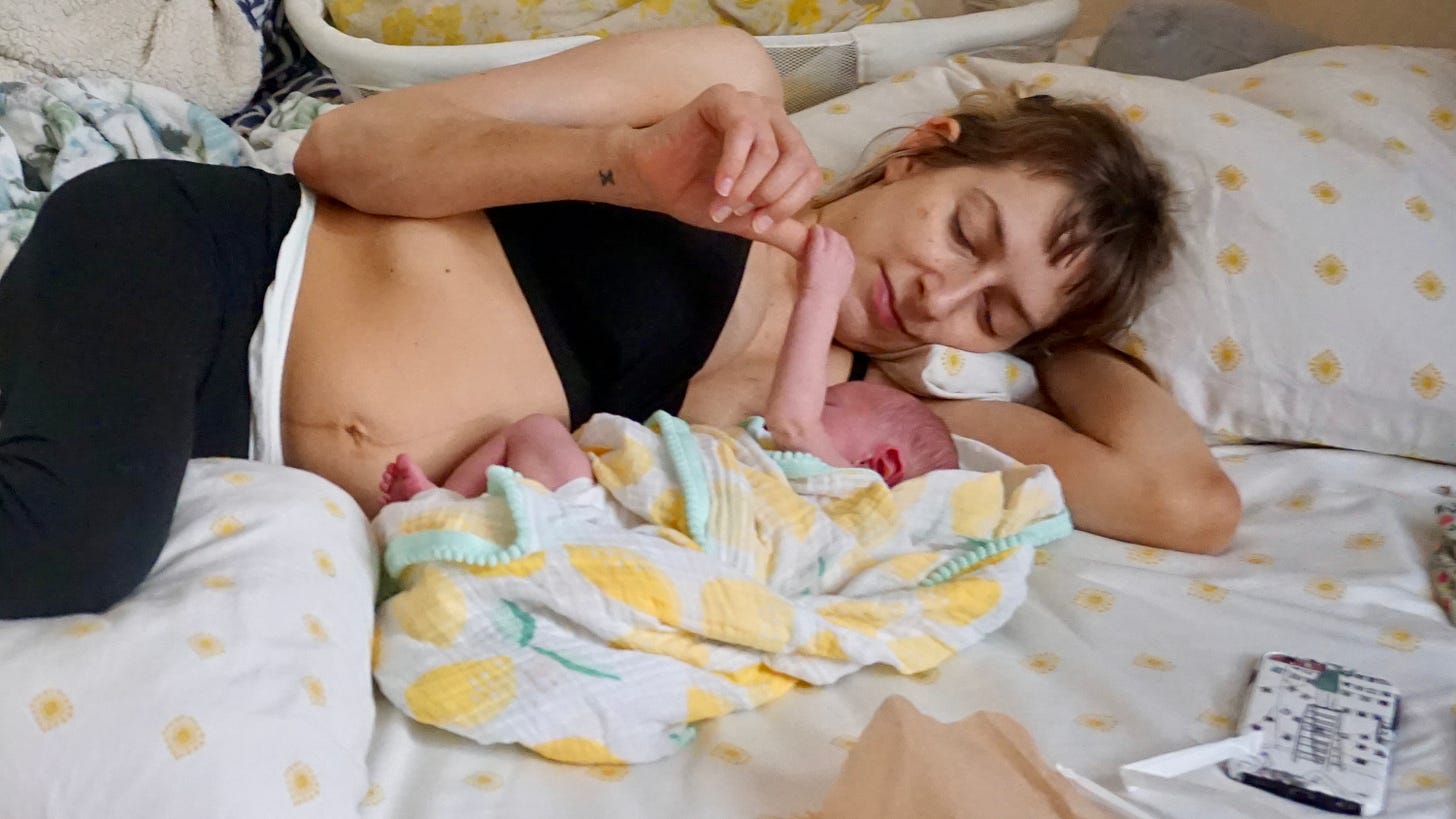
I am a Kurt Vonnegut character, “unstuck in time.” I am an Alice Wong oracle – a ghost from the past and here to testify to a future that is closer than the people of my planet seem to understand. Have I gotten grandiose enough yet? I suppose I’ve been feeling a bit grandiose. Or, at least, urgent. As my body is slipping and sliding through time, I am watching my government carelessly sweep through, cut, and destabilize services across the country that support us in our inevitable vulnerabilities over the span of a lifetime in these bodies of ours – programs that seek to make polling places more accessible, that connect folks who’ve been paralyzed or lost a limb with resources, that support teenagers with disabilities as they make that terrifying transition from high school to adulthood, that help older people prevent falls, that care for coal miners with black lung disease. This is to say nothing of the programs yet to be put on the chopping block.
It’s possible that some of these programs will be revived – maybe find a home somewhere else. Many will not. And much will be lost – many will be harmed – in the chaos.
Maybe it’s the company I keep, but honestly, the older I get, the more ubiquitous, inevitable, and utterly commonplace disability seems to be. There are ten thousand things that make us different, but one thread that holds every single human together is the fact that we will live our entire lives linked to one body, and those bodies will change, age, get sick, and fall apart over time. Each of us will inevitably require increasing levels of support and care across our lives. We will love people who require support and care. Sometimes I feel like I’m pleading with the first-class passengers on the Titanic while they recline in the smoking lounge – Water is rushing into the lower decks! We need more lifeboats! Everyone chuckles – Silly girl, have you seen how pretty and big our boat is? Come sit and have a cigar!
Maybe it’s crip time itself that allows me to slip into some kind of wizened perch – the ancient Rebekah watching from somewhere above or beyond present Rebekah – and she shows me a glimpse of all of us – I mean every single one of us in our baby bodies, our disabled bodies, our sick bodies, our old age bodies – all of us pressed right up against the organic material that makes up our vulnerable existence. How often it starts and ends and, yes, even middles with needing someone to wipe our bum. Help us eat. Listen to us marvel and grieve the ways our bodies are changing. Find ways to understand us – to keep listening – even when we lose the ability to form the words. Even when we never had words to begin with.
I don’t mean to imply that any of this is easy or light or simple. Often, it’s the opposite. Existing in crip time – witnessing someone you love in crip time – can be terrifying. It can be grief, can be fury, can be bewilderment. Caring and being cared for – especially in this world that does not prioritize care work – can be heavy – can take a deep, profound toll. Crip time doesn’t always take us to places we want to be.
But this is what I wish we all understood: when we mock and shame and abandon the ones we perceive to be on the “outside” – the old, the sick, the disabled, the ones who don’t match the narrow timeline we’ve doled out for the human body/mind – we mock, shame, and abandon ourselves. I see the thread looping – laughing at the old ladies chatting about their arthritis, mocking the package of Depends lives in the same story as flippant cuts to programs that buoy us when our bodies need help.
And yet – we are all little mushrooms, here for one bright and stormy morning, bursting awake and quickly fading as we try to learn and quickly forget how to wield these material forms to which we are tethered. Having a body is messy, nonlinear, and inherently, unavoidably vulnerable. Not one of us is exempt from the rules of this game.
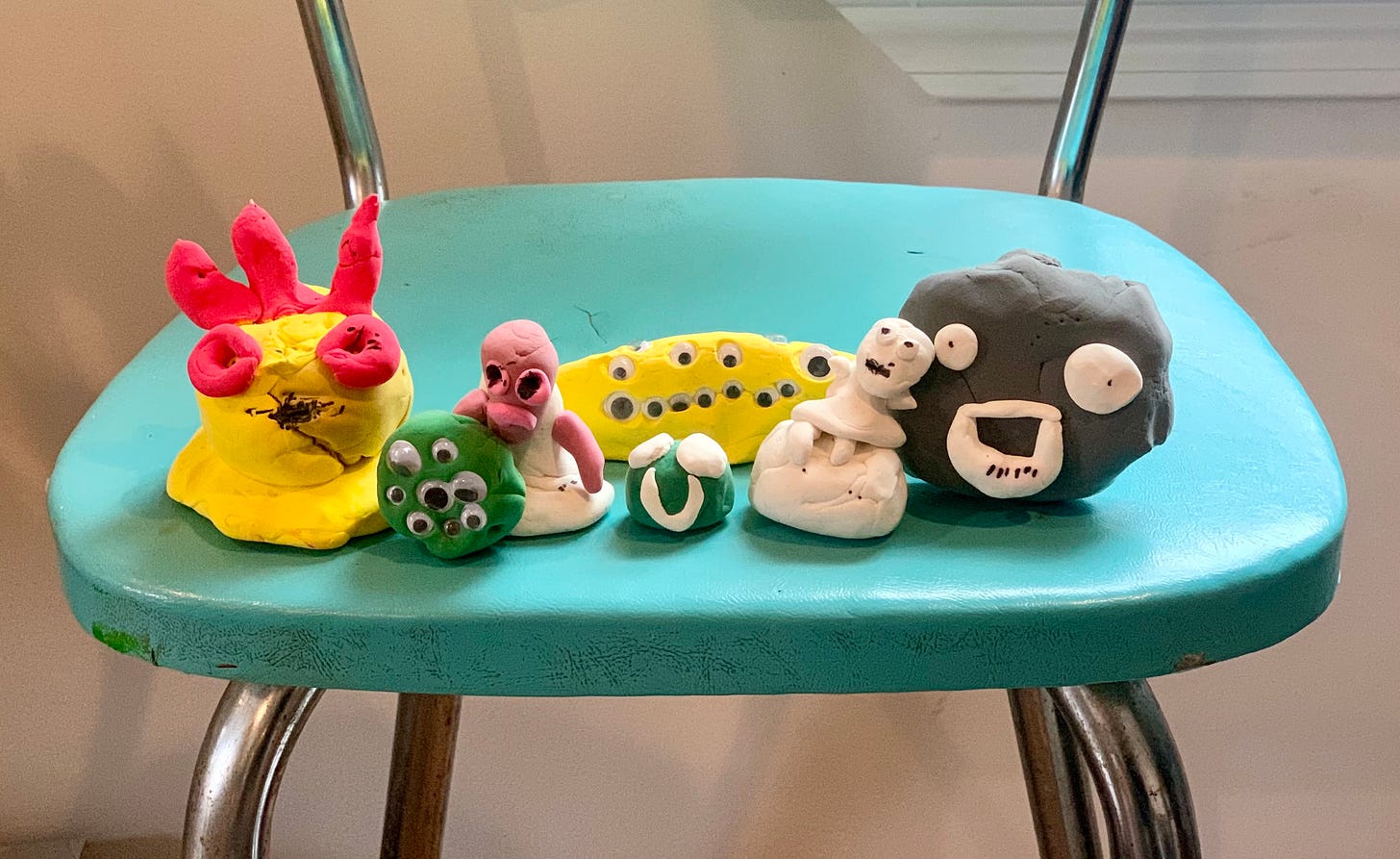
I will continue to insist – for you and for me, for my mom and my grandma, for my niece and my sister, for my son and my partner – there is no shame in having a body, no shame in needing care, no shame feeling our own vulnerabilities. When we need help and when we are helping, there is dignity here.
So hold your head high, baby. Put on your favorite earrings, swish your ruffled dress. I’ll throw our wet and dirty laundry in the wash again and again. I will look you in the eye. I will listen. We will not belittle the absolutely absurd, crushingly mundane wonder that is life in these bodies of ours.
CHEWY QUESTIONS – If you want to continue to think through the ideas here, these questions are for you – please feel free to explore this in your personal writing, to talk about it with your people, or to join the conversation on Substack.
How would you describe your body’s relationship with time? Do you ever feel out of sync with the clock or the calendar? What does that tension look/sound/feel like?
Do you remember a time when you learned to be ashamed of your body? If you could talk to that version of you today, what would you say?
New Books! — Spring 2025
We Are the Scrappy Ones is now available to order wherever books are sold, HOWEVER, if you want a signed copy of the book AND want to support the coziest local bookshop, you can order through one of our all-time favorite spots, Monstera’s Books.
Owning It: Tales From Our Disabled Childhoods made its way into the world last week! I’m thrilled to have an essay included in this forthcoming YA collection of first-person essays, edited by Jen Campbell, Lucy and James Catchpole, and illustrated by Sophie Kamlish. (All orders from Blackwell’s – linked above – include free shipping to the US!)
Upcoming Events — Spring 2025
KC Shelf Life Storytelling Event — May 1
Barstow Community College — May 9
Thank you, as always, for being here.

Rebekah







Rebekah, thank you. I read your gorgeous essay from bed—where I promptly returned after sending the kiddo off to school—already fatigued at the start of the day and everything hurting. I feel far less alone now. 💛
Lately, it seems like my body has its own alphabet to sing with its new pains and diagnoses. I’m tired, wholly and completely, yet I keep going. Going towards what? Sometimes I’m not sure. Towards the direction of hope, I think. Moving slowly, snail-like, in the ways that I know how. I have a little ceramic snail on my windowsill to remind me of this idea of patient endurance.
Time has been a weird concept for me, and I wonder if chronic illness is what’s reshaped the feeling of it… at least a little? I got sick in my teens, and my 20s looked nothing like my peers’. My body has aged and my perspective on life has matured (/is still maturing!), but my inner-self feels like I’m still 17. I’ve never thought of this till now, but I wonder if it’s because that’s when the world slowed down for me—almost to a halt. I thought I would’ve logged so many more experiences at this point in my 30s, but so much has been spent in bed, resting and trying trying trying to remember my worth is not in my performance (hard to remember as someone who grew up in the church *and* was formerly a ballerina).
Your words here clearly spurred new thoughts in me, and they must’ve been looking for a place to land. I hope you don’t mind. Thanks for opening this space for dialogue and creating a place of safety in this online landscape.
Grateful for you and your work. And now, I feel inspired to do more writing of my own. 😌
Thank you so much for your brave and honest words. As the mother of a son with a mental health disability I feel all of what you are saying, so profoundly. Keep on writing, we all need to hear what you have to say.